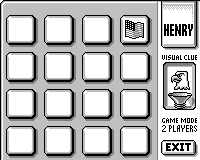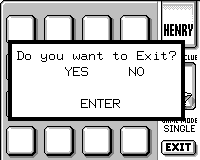Retro Replay Review
Gameplay
Henry presents a deceptively simple yet engaging matching experience that challenges both your auditory and visual memory. You start each round by receiving a clue—this might be a distinct sound or a vivid image—and your task is to find the corresponding item among 16 concealed buttons. Each correct match causes the button to light up, and the goal is to secure four lights before your opponent does. Pull off that final, decisive match and you claim the victory.
(HEY YOU!! We hope you enjoy! We try not to run ads. So basically, this is a very expensive hobby running this site. Please consider joining us for updates, forums, and more. Network w/ us to make some cash or friends while retro gaming, and you can win some free retro games for posting. Okay, carry on 👍)
What sets Henry apart is the flexibility of its game modes. Practice mode lets you fine-tune your reflexes and pattern-recognition skills at your own pace, free from the pressure of competition. Single-player mode positions you against Henry himself, turning every match into a personal duel against the AI’s steadily improving “intuition.” And for those looking to engage in face-to-face rivalry, Two-Player mode alternates turns between you and a friend, creating tense, back-and-forth showdowns that are perfect for living-room competitions.
The game also allows you to toggle sound clues or visual clues on and off, tailoring the difficulty to your preference. Want a pure auditory challenge? Silence the visuals and focus on the soundtrack cues. Prefer relying solely on imagery? Mute the sounds and put your eyes to the test. This customizability not only extends replay value but also makes Henry accessible for players of all ages and skill levels.
While each round is brisk—lasting only until four correct matches are made—the quick-play sessions can become highly addictive. The momentary thrill of uncovering that last pair, especially when you’re down by a point or two, delivers a satisfying rush. However, some players may find the core loop a bit repetitive over extended play; the absence of additional obstacle mechanics or power-ups means the challenge is confined to pure memory and recognition.
Graphics
Visually, Henry opts for a clean and colorful interface that prioritizes clarity over flashy effects. The 16 buttons are laid out in a neat grid, each concealing an icon that is brightly colored and easily distinguishable. This straightforward design ensures that players of all ages can quickly identify patterns without eye strain or confusion.
When you make a correct match, the button emits a warm glow that gives immediate feedback and adds a touch of visual delight. The lighting effect is subtle but gratifying, reinforcing your sense of progress as you rack up matches. Transitions between turns are swift, keeping the pace brisk and the mood light.
While Henry’s graphics lack dynamic animations or detailed backgrounds, this minimalism works in its favor by keeping the focus firmly on the puzzle at hand. The static backdrop remains unobtrusive, allowing you to hone in on the icons and sounds without distraction. That said, players expecting more intricate visual storytelling or 3D elements may find the presentation utilitarian rather than immersive.
Overall, the graphic style is well-suited to Henry’s core objectives: a memory-centric matching game that demands attention to detail. Its bright palette and clear iconography make it immediately accessible, and the polished, no-frills aesthetic ensures the gameplay always takes center stage.
Story
Henry is, at its heart, a puzzle game, so don’t come looking for an epic narrative or branching storylines. Instead, the “story” here is written in the fleeting moments of recognition—when you hear a familiar sound or spot a memorable image and your brain clicks into place. Those instances of cognitive triumph become the emotional beats of the experience.
The titular character, Henry, serves more as a mascot or host than a protagonist with motivations or arcs. In Single-player mode, he provides the opposition, but he’s never given dialogue or backstory. This simplicity means that the “storybook” atmosphere rests entirely on the design of the clues and the satisfaction of successful matches, rather than on any plot or character development.
Some players may miss a narrative framing device or thematic progression, but for others, the absence of story is a feature, not a bug. By stripping away extraneous lore, Henry zeroes in on what it does best: offering a tight, replayable matching puzzle. If you crave a deep storyline, you’ll need to look elsewhere; if your priority is pure, undiluted mental challenge, Henry delivers exactly that.
In short, the story—or mild thematic concept—exists in the interplay of your senses and reactions. Each round feels self-contained, and every match is its own mini-victory. The narrative flow is internal rather than external, built on the satisfaction of pattern recognition rather than character-driven drama.
Overall Experience
Henry shines as a pick-up-and-play puzzle title that rewards quick thinking and keen observation. Its three game modes offer enough variety to keep casual players engaged, while the sound/visual toggle provides customizable difficulty that can cater to beginners and seasoned puzzlers alike. Whether you’re looking to sharpen your memory in solo practice or engage in a friendly rivalry, Henry adapts to your needs.
The streamlined presentation and rapid game cycles make Henry perfect for short bursts of gameplay—ideal for commutes, coffee breaks, or family game nights. Its accessibility ensures younger players can join in, while the competitive element adds tension for veteran gamers. The absence of microtransactions or filler content keeps the experience honest and unencumbered.
On the downside, some may find that Henry’s formula lacks long-term depth. Once you’ve mastered the core matching mechanics, there are no additional modes, leaderboards, or varied objectives to chase. That said, the simplicity can be seen as a virtue: Henry does one thing and does it well, without overcomplicating the formula.
Ultimately, if you’re in the market for a lightweight but mentally stimulating game that blends auditory and visual puzzle-solving, Henry is an excellent choice. Its intuitive design, flexible modes, and polished interface make it a standout in the casual puzzle genre, delivering quick thrills and friendly competition in equal measure.
 Retro Replay Retro Replay gaming reviews, news, emulation, geek stuff and more!
Retro Replay Retro Replay gaming reviews, news, emulation, geek stuff and more!









Reviews
There are no reviews yet.